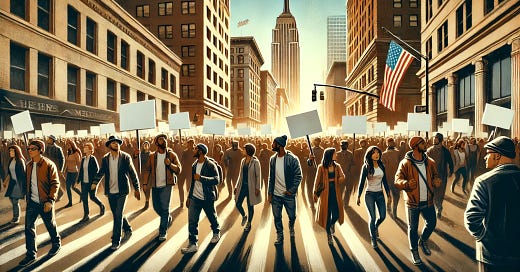The View from East Berlin: A Historical Warning
These days, I consume the news with a heaviness I haven't felt in decades. My mind keeps returning to a history museum I visited years ago in early 1989. It was on the other side of the wall, in East Berlin. I had arrived from the east and was on my way home after being away for nine months. Since I had left Hong Kong five weeks earlier, I had traveled in Communist countries. I had no idea of the monumental change that would soon take place in these countries that would forever change history.
It was fascinating to experience an entirely different version of 19th and 20th-century history in that museum in the German Democratic Republic. Each event was described as a chapter in a permanent ideological battle between communism and capitalism, with - no surprises here - communism as the ultimate victor. The Soviet-led communist bloc was a force for peace and progress, starkly contrasting with the greed, inequality, and imperialism of capitalist nations like the United States. World War II and the Cold War were framed as struggles in which communism emerged as a morally superior system despite challenges from Western powers. It was hard to find differences between fascism and Western democracies.
Project 2025: History's Pattern Repeats
The part of the exhibition that was, in my Western eyes, more acceptable was a timeline that showed how the Nazi regime's policies of exclusion expanded in ever-widening circles. It started with those deemed "different" or "far away" from the perceived core of society -easy targets- before eventually engulfing everyone in its destructive wake.
More than 35 years later, I watch with growing concern as similar patterns of targeting those deemed "different" emerge in American politics. The first moves have been calculated and precise, beginning with USAID - an agency that serves those furthest from the American heartland: non-Americans, poor, often of different faiths and cultures. Even as Elon Musk accumulated far more wealth since the elections than USAID's entire budget, they champion these cuts as necessary efficiency measures. It's a familiar playbook: start with those who seem most distant from the perceived core.
The Ripple Effect: From Global Aid to American Farms
History teaches us that such policies never remain distant for long. Already, the ripples are reaching American shores. In the heartland, farmers who fell for the promise to make America great again now face the harsh reality that their produce no longer has a guaranteed buyer in USAID's food aid programs. These real Americans face real consequences, just like countless other Americans whose income is related to USAID's activities.
In Nazi Germany, the regime's policies began by targeting minorities - Jews, homosexuals, the mentally ill, and others - while leaving what they considered the "core" of society initially untouched. It wasn't until the brutal winter of 1942-43 that even the hundreds of thousands who matched their ideal of "Aryan" perfection faced starvation and death in the Russian snow. By then, it was too late to stop the machinery of destruction.
The 50501 Movement: America Responds
But there's hope in how this modern story differs. Unlike in 1930s Germany, today's institutional guardrails are stronger. Conservative members of Congress, even from deep red states, receive ever more calls from concerned constituents - not just farmers, but businesspeople and community leaders who understand that America's global engagement serves our national interests.
The resistance isn't coming just from expected quarters. In state after state, people who once cheered promises of government efficiency will increasingly question the actual costs. The businessman who cheered cuts to foreign aid might soon find his export markets drying up. The voter who supported reducing the federal workforce might discover that their local economy depended more on those government jobs and policies than they realized.
From Senate to Streets: Democracy's Defense
Yet, unlike the dark historical precedents, today's story has no predetermined ending. In congressional offices across Washington, phones ring with constituent concerns. On average, Congress receives 40 calls per minute; yesterday, it was 1600 per minute. In heartland communities, farmers and business leaders will increasingly be finding their voices. The very interconnectedness that makes Americans vulnerable to cascading impacts also strengthens them.
Protests against Trump's policies are intensifying all over the country. Yesterday, there were protests in all 50 states, even conservative ones like Oklahoma or North Dakota. It's a grassroots movement called the "50501" movement aimed at 50 states and 50 protests in 1 day.
The lesson of history isn't just about how darkness spreads - it's about how early recognition and resistance can change the story's ending. Today's America isn't 1930s Germany, and that's precisely the point. Not all Americans have the advantage of historical knowledge, but enough do. I hope strong institutions and interconnected communities recognize and reject the politics of division before expanding beyond control. The signs are encouraging now that a growing movement is taking to the streets, organizing and making their voices heard. Even in Washington, there's change: Democratic senators, sensing their constituents' urgency, will stay in the chamber tonight, taking the floor for the maximum allowed time of 30 hours, united in their opposition to Russel Vought's nomination as the budget chief of the White House.
Standing in that East Berlin museum in 1989, I couldn't have imagined I would one day see echoes of those historical patterns in American democracy. But unlike that museum's predetermined narrative of ideological triumph, the American story remains unwritten. Every day, more Americans will recognize that policies targeting "others" ultimately affect us all. In our interconnected world, there really is no "other" - only an expanding circle of impact that eventually reaches everyone. The question is whether the American voters will heed history's lessons in time to write a different ending.







Spot on! It was Martin Niemoeller who wrote thiw:
" First they came for the socialists, and I did not speak out—because I was not a socialist.
Then they came for the trade unionists, and I did not speak out—because I was not a trade unionist.
Then they came for the Jews, and I did not speak out—because I was not a Jew.
Then they came for me—and there was no one left to speak for me."
—Martin Niemöller
This quote is attributed to the prominent German pastor Martin Niemöller. It is sometimes mistakenly referred to as a poem.
It's paart of the permanent collection at the U.S. Holocaust Museum that opened in 1993,
You have accurately described the development. I am heartened by the movement. I had faith in my people but I am also encouraged by Dem leadership who are actually working to a positive outcome. You also accurately describe the repercussions that have not occurred to many voters. It is imperative we keep up the pressure. Thank you for this serious observation. And thank you for the happiness you spread as we work to survive this onslaught.